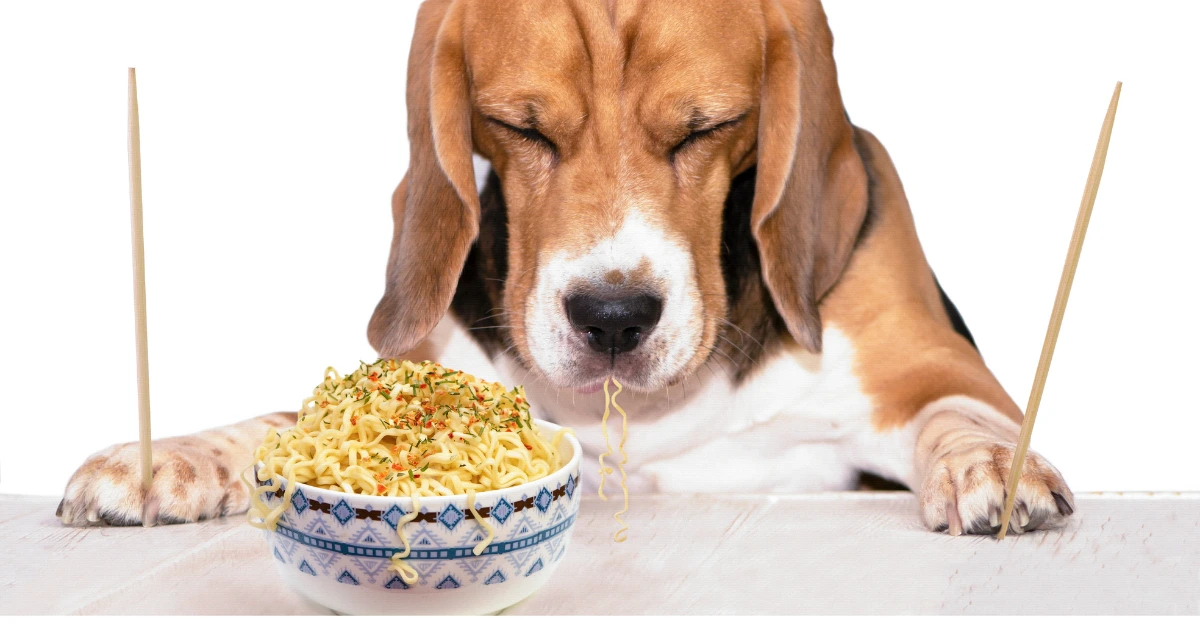As a dog owner, it’s natural to wonder what human foods are safe for your furry friend. Ramen noodles, a popular and convenient meal option for many people, often spark questions about whether they are suitable for dogs. This article will explore the safety of feeding ramen noodles to dogs, the potential health risks, and alternatives to consider.
Are Ramen Noodles Safe for Dogs?
Technically, dogs can eat plain ramen noodles in small amounts, but they are not recommended as a regular part of a dog’s diet. Ramen noodles are primarily made from wheat flour, salt, and water, which do not provide significant nutritional value for dogs. Here are some important considerations to keep in mind when it comes to feeding ramen noodles to your pet.
Nutritional Considerations
-
Lack of Nutrients: Ramen noodles are mostly carbohydrates and contain minimal protein, vitamins, and minerals essential for a dog's health. Dogs require a balanced diet rich in nutrients, which ramen noodles do not provide.
-
High Sodium Content: Most instant ramen noodle packets are high in sodium due to seasoning packets. Excessive sodium can lead to health problems in dogs, including dehydration, kidney issues, and increased blood pressure.
-
Preservatives and Additives: Many commercial ramen noodles contain preservatives, artificial flavors, and additives that can be harmful to dogs. Ingredients like garlic and onion powder, commonly found in ramen seasonings, are toxic to dogs and should be avoided.
-
Digestive Issues: Some dogs may have difficulty digesting processed carbohydrates like those found in ramen noodles. Feeding them noodles could lead to gastrointestinal upset, including diarrhea or vomiting.
Risks of Feeding Ramen Noodles to Dogs
-
Obesity: Regularly feeding your dog high-carb, low-nutrient foods like ramen can contribute to weight gain and obesity. Maintaining a healthy weight is essential for your dog's overall health.
-
Potential Allergens: Dogs can be sensitive to wheat or gluten, which are common ingredients in ramen noodles. If your dog has a known allergy or sensitivity to these ingredients, feeding them ramen can cause adverse reactions.
-
Salt Toxicity: High sodium levels can be particularly dangerous for dogs, leading to salt toxicity. Symptoms of salt toxicity include excessive thirst, urination, vomiting, diarrhea, and, in severe cases, seizures.
Guidelines for Feeding Ramen Noodles to Dogs
If you decide to give your dog a small amount of ramen noodles as an occasional treat, follow these guidelines:
-
Plain Noodles Only: Avoid feeding your dog the seasoning packet that comes with instant ramen. Seasonings often contain harmful ingredients, such as garlic, onion, and excessive salt.
-
Cook Thoroughly: If you prepare homemade ramen, ensure that the noodles are cooked thoroughly and free from additives or unhealthy oils.
-
Moderation is Key: Offer ramen noodles only as an occasional treat and in small amounts. Make sure it doesn’t replace a balanced, nutritious diet.
-
Monitor for Reactions: When introducing any new food, watch for signs of allergies or digestive upset, such as vomiting or diarrhea. If any adverse reactions occur, discontinue feeding ramen noodles.
Healthy Alternatives to Ramen Noodles
If you’re looking for safe and nutritious meal options for your dog, consider these healthier alternatives:
-
Whole Grains: Foods like brown rice, quinoa, or oats are healthier grain options that provide better nutritional value for dogs.
-
Vegetables: Steamed or cooked vegetables such as carrots, green beans, and sweet potatoes can be great additions to your dog's diet.
-
Lean Proteins: Cooked chicken, turkey, or fish can provide the protein dogs need for muscle development and overall health.
-
Commercial Dog Food: High-quality commercial dog foods are formulated to meet all of your dog's nutritional needs, ensuring they receive a balanced diet.
Conclusion
While dogs can technically eat ramen noodles in small amounts, they are not a suitable food choice for your pet. The lack of nutritional value, high sodium content, and potential harmful additives make ramen noodles an unsuitable regular treat for dogs. If you wish to share a human food with your dog, opt for healthier alternatives that contribute positively to their diet.
Always consult your veterinarian before introducing new foods into your dog’s diet. By understanding what foods are safe and beneficial for your furry friend, you can help ensure their health and well-being.


